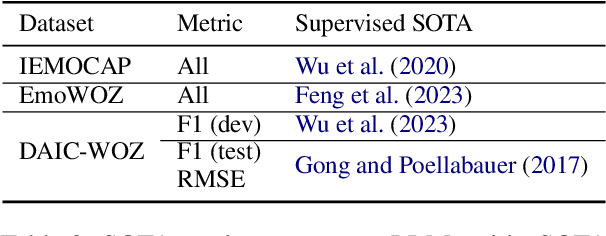Affect Recognition in Conversations Using Large Language Models
Paper and Code
Sep 22, 2023



Affect recognition, encompassing emotions, moods, and feelings, plays a pivotal role in human communication. In the realm of conversational artificial intelligence (AI), the ability to discern and respond to human affective cues is a critical factor for creating engaging and empathetic interactions. This study delves into the capacity of large language models (LLMs) to recognise human affect in conversations, with a focus on both open-domain chit-chat dialogues and task-oriented dialogues. Leveraging three diverse datasets, namely IEMOCAP, EmoWOZ, and DAIC-WOZ, covering a spectrum of dialogues from casual conversations to clinical interviews, we evaluated and compared LLMs' performance in affect recognition. Our investigation explores the zero-shot and few-shot capabilities of LLMs through in-context learning (ICL) as well as their model capacities through task-specific fine-tuning. Additionally, this study takes into account the potential impact of automatic speech recognition (ASR) errors on LLM predictions. With this work, we aim to shed light on the extent to which LLMs can replicate human-like affect recognition capabilities in conversations.
 Add to Chrome
Add to Chrome Add to Firefox
Add to Firefox Add to Edge
Add to Edge